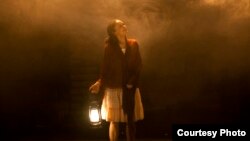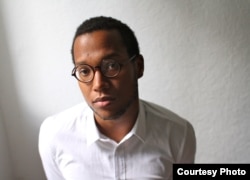Branden Jacobs-Jenkins uses the stage to get audiences thinking and talking about identity in America. Over the past five years, the 30-year-old playwright has established himself in the profession with a trilogy of highly provocative and fantastical explorations of race.
In Neighbors, a family of minstrels in black-face moves in next-door to a contemporary mixed race family. In Appropriate, a white family discovers their dead father belonged to the racist Ku Klux Klan. And An Octoroon, now being staged in Brooklyn, is a loose adaptation of a melodrama written more than 150 years ago that deals with identity and race.
At the beginning of the play, a man dressed only his underwear walks onstage, takes a long look at the audience and says, morosely: “Hi everyone, I’m a 'black playwright.' I don’t know exactly what that means, but I’m here to tell you a story.”
The comment gets a big laugh. And that’s the line Jacobs-Jenkins is trying to tread, between poking fun at theatrical convention and making people think about race, labels and identity. He wonders what being a "black playwright" really means.
“I mean, I guess, it’s that I’m black, but then, why isn’t Sam Shepard a white playwright? I just feel like it’s qualifying something and I don’t know why or what it’s qualifying exactly. I can understand it as a descriptive term, but I don’t know what it means as, like, a profession,” he said.
A forbidden love story
The play on which An Octoroon is based, by Irish-Anglo playwright Dion Boucicault, tells the story of a young man who’s about to inherit a plantation and falls in love with a woman who’s an octoroon - 7/8ths white,1/8th black. At that time in America, having just one black great-grandparent was enough to identify someone as black, and under anti-misegenation laws, prohibited from marrying anyone who was white.
Jacobs-Jenkins uses whole sections of the florid original dialogue.
Zoe, the octoroon of the title, says, in despair, "That is the dark fatal mark of Cain, of the blood that feeds my heart, one drop in eight is black. Bright red as the rest may be, that one drop poisons all the rest. Those seven bright drops give me love like yours, hope like yours, ambition like yours, passions hung from life like dewdrops on morning flowers. But the one black drop gives me despair for I'm an unclean thing - I'm an octoroon."
She’s saying that to a black actor, portraying the plantation owner, in white-face. Director Sarah Benson points out that, in the original, all the parts had to be played by white actors. “Of course, the deep irony about the whole situation is there wasn’t a black person in the room. All of the actors onstage were white people in various degrees of black-face.”
Playwright Branden Jacobs-Jenkins says when he read the original, he was struck by Boucicault’s apparent understanding of those different degrees of color.
“Not every person of color is the same shade or looks the same or is the same," he noted, adding, "that was so profound to me. And I was like, 'right, because it’s about masks.' He was describing the mask that he wanted his actors to play, because the theater is a place where you’re supposed to transform; where you’re supposed to, like, experience the magic of like being something, but not being something. And you know, that’s all about identity, that’s all about race as we’ve received it.”
Updating a 19th century melodrama
Jacobs-Jenkins is not so much adapting Boucicault’s play as sampling it, like a piece of music, so he mixes the original dialogue with contemporary speech.
In one scene, one slave says to another, "Massa Peyton won me in a poker game, like, ten years ago." As they talk about other slaves they know, her friend explains, in a rapid-fire patter that could be heard from a teenager today in a suburban shopping mall, "Chris was messing with Tricia over in the sugar mill for a little bit, and I met him and Darnell through her at a slave mixer over by the river before, you know, she dumped him because she couldn't deal with the long distance..."
Branden Jacobs-Jenkins says his modernist take on Boucicault has more in common with the original than you might think. Though the two playwrights are centuries apart and of different races, their goal is to entertain the audience.
“An audience wants to enjoy itself," he stressed. "And that’s all [Boucicault] talked about! It’s about an audience wanting to feel something. And they want to feel it, so give it to them! And then, if you get to, like, teach ‘em a lesson or let them know something else, then that’s even better!”
And Jacobs-Jenkins hopes An Octoroon will do just that.





